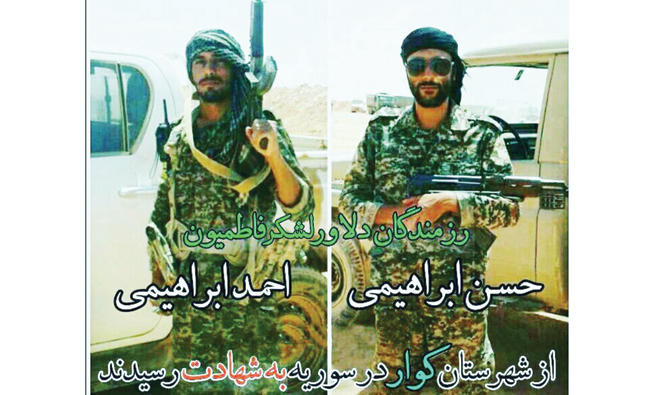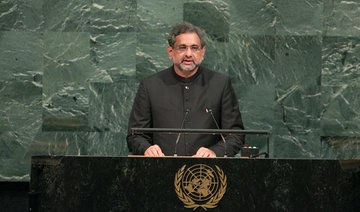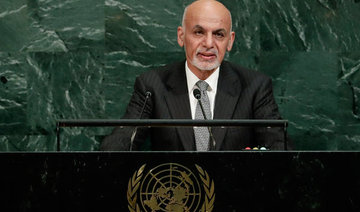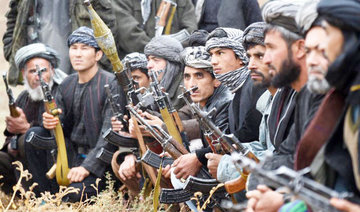KABUL: An Afghan soldier who is killed in action gets barely enough compensation to cover the funeral expense. A wounded soldier receives far less.
But the package Iran offers Afghans to fight in Syria is far more attractive: Permanent residency for the deceased’s family, accommodation and several years of monetary support for the household. A wounded Afghan mercenary receives more or less the same.
This attracts desperate and jobless Afghan refugees in Iran, as well as many in Afghanistan, to fight in support of the Syrian regime.
The main source of recruitment in Afghanistan is the peaceful yet impoverished parts of the central highlands with a predominantly Shiite population.
Some 700,000 Afghans reportedly live illegally in Iran, besides nearly a million registered refugees. This collectively provides Tehran with a breeding ground for recruitment.
Abdul Hameed, 19-year-old school graduate from Afghanistan’s Bamiyan province, fought in Syria.
Jobless and frustrated at home, he went to Iran in 2012 aged 14 and managed to get a job. But after working for a year as a laborer, he became jobless again and his savings ran out.
The war in Syria was at its peak in 2014, and a group of Afghans serving Iran’s government gave him an offer to go to Syria, which he accepted without hesitation.
“The proposal was approximately $300 a month, permanent residency in Iran and other concessions depending on whether I’d die, get injured or return safe,” Hameed told Arab News.
“We were sent by plane from Iran to Syria and settled in Aleppo. The process of recruitment isn’t compulsory. Iran doesn’t force you to go to Syria.”
In Aleppo, Hameed met fighters from other Muslim countries such as Pakistan, Iraq and Lebanon. Separate camps were designated for each country, he said.
“The Afghans were called Fatemiyun, the Pakistanis were named Zainebiyun, and the Iraqis were called Haidaris. There were 12 Iranian commanders who provided training or gave commands.”
Before joining the battlefield, the recruits undergo training involving small and heavy weaponry, as well as land mines, said Hameed.
That would be followed by a short trip to Iran, then back to Syria to face groups such as Al-Qaeda and Daesh.
“They’re beheading people and destroying our (Shiite) mosques and holy places. I’ve seen it with my own eyes,” Hameed said. Fighters from Pakistan travel overland to Iran and are then flown to Syria, he added.
Hameed’s time in Syria came to an end when one night, a large number of Afghan fighters came under sudden attack from militants.
“There was a massive attack against us. We couldn’t resist. Some 200 Afghans died that night alone,” he said.
“Me and 30 others were injured and taken to hospital in Syria, then transferred to a hospital in Iran for a month.”
After his recovery Hameed stayed in Iran for three months, but then returned home to his family, who were completely unaware of his trip to Syria.
“I was given a 10-year residency permit in Iran, but I declined it and returned home last year,” he said. Hameed has a baby now, but is jobless again.
An Afghan government official, speaking on condition of anonymity because he is not authorized to speak to the media, told Arab News: “This is a highly sensitive issue. If the government give figures and comments, Daesh will turn its attention toward Afghanistan, viewing it as the ground from where Shiites go to Syria to fight them.”
Daesh’s affiliates in Afghanistan have frequently targeted Shiite congregations and mosques in recent years.
There is no public record of when Iran began recruiting Afghans or how many have been recruited.
But Waheed Mozhad, an Afghan analyst and writer, said the number of fighters who have gone back and forth is around 10,000, and recruitment began in 2013.
Safora, a female lawmaker from Bamiyan, said some Shiite clergy in Afghanistan have aided recruitment.
“Poverty and desolation have forced people from central areas of Afghanistan to go to Syria,” she told Arab News.
“We’re totally against it, but people need food and other necessities for their families, so they go for it,” she said.
“I know people from different provinces who lost their sons in the war in Syria. I know some families who went to Iran, to get a house and other concessions promised by Tehran, after they lost a family member in Syria,” she added.
“Unfortunately, the Afghan government has done nothing to stop this recruitment or confront Tehran over the issue.”
Poverty, religious fervor push Afghans to join Iran’s war in Syria
Poverty, religious fervor push Afghans to join Iran’s war in Syria
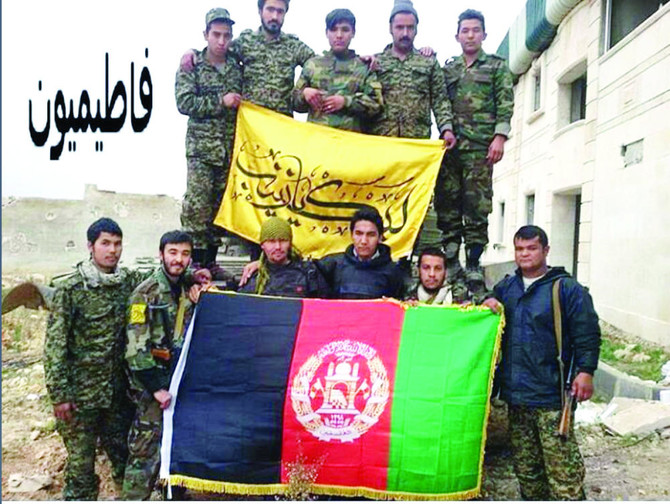
Iran’s foreign minister heads to Muscat for nuclear talks with US

- Iran will engage in the talks “with authority and with the aim of reaching a fair, mutually acceptable and dignified understanding on the nuclear issue,” a spokesperson said
TEHRAN: Iran’s Foreign Minister Abbas Araqchi has departed for the Omani capital Muscat at the head of a diplomatic delegation for nuclear talks with the US due to be held on Friday, the Iranian Foreign Ministry’s spokesperson said.
The US and Iran have agreed to hold talks in Oman on Friday, officials for both sides said, even as they remain at odds over Washington’s insistence that negotiations must include Tehran’s missile arsenal and Iran’s vow to discuss only its nuclear program.
Iran will engage in the talks “with authority and with the aim of reaching a fair, mutually acceptable and dignified understanding on the nuclear issue,” the spokesperson Esmail Baghaei said on Thursday.
“We hope the American side will also participate in this process with responsibility, realism and seriousness,” Baghaei added.


